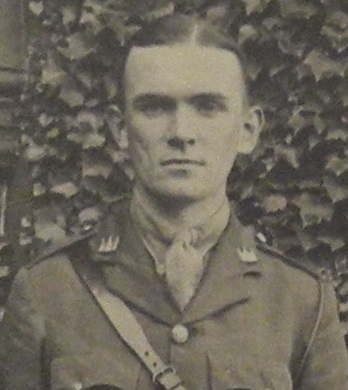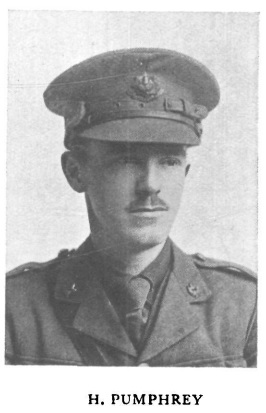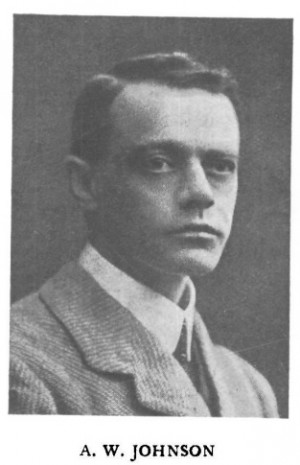
Stephen Walker, of London, was killed in a flying accident near Duxford on 14th May 1918, aged 26 years.
Stephen was born in Saffron Walden on 24th January 1893. He spent most of his childhood at the Friends’ School, Saffron Walden, where his father was headmaster, and attended Bootham School from 1908 to 1910.
The school magazine, “Bootham”, of February 1909 reports on the school Christmas Exhibition of 1908:
“Several good cupboards and cabinets appear, the best of these being the oak cabinet by R. Gibbins while the work of Walker, Clothier, D. Goodbody and Scrimgeour was commended and prized.”
Stephen won the Workshop prize for Cupboards, and Boxes etc. By 1910, Stephen was one of the judges for Workshop prizes.
He was keen on sports at Bootham and was in the 1st XI football and cricket teams.
In “Bootham” of May 1909:
“Football Notes by the Captain:
WALKER, S.—Has rendered very valuable assistance, at a time when Mr. Pollard’s retirement left a very difficult gap to fill. Kicks well, and tackles promptly.”
“Bootham” of October 1909 reports
“The School Term
The Pageant cannot be described; a rainfall toward the end caused the performers to omit the ” march past,” which is regrettable. This spectacle made the last half day of the term a memorable one. A number of parents of boys were present, and after supper at the school, joined us in the John Bright Library, where announcements were made of the cricket prizes and aquatics prizes. G. H. Pearman was awarded the bat for the best batting, S. Faraday the one for best bowling, and S. Walker a special bat for his fine record of 47 wickets at an average under 14.”
By March 1910, Stephen had joined the football committee at school.
In “Bootham” of May 1910 we read:
“Football report:
Nov. 13, v. NORTHERN FOXES. Lost, 1—3.
S. Walker, at right back, always a mainstay of the team, played even better than usual.
Football Notes by Captain
WALKER, S.—-Is an extremely difficult man to get past, owing to his length of leg and speedy and timely tackling. But a most unfortunate habit of sitting down gives a great advantage to a forward who does escape him.”
By the October 1910 issue of “Bootham”, Stephen had joined the cricket committee. This issue includes the following:
“Notes on the Team by the Captain
WALKER, S.—Has kept up a good bowling standard— sometimes very difficult, with varying pace and break, but easy balls on the leg side come too frequently. Takes O.S. bat for batting, being very successful early on ; his play is vigorous and entertaining, but after all the first thing is to stay in!”
and
“Bene Decessit
S. WALKER has been a mainstay to the cricket and football teams for two years, and has just passed London Matric. He has twice running been awarded the Old Scholars’ bat, and this year he was top of the School batting averages, and third on the bowling, with 61 wickets to his credit. He was also one of the soundest full-backs the School has known.”
A few years later, “Bootham” of November 1913 reports:
“Across the Months
STEPHEN WALKER (1908-10) has passed the Intermediate Exam, of the Institute of Chartered Accountants in England and Wales.”
and then in “Bootham” of March 1916:
“Across the Months
Degrees etc.
STEPHEN WALKER (1908-10) has passed the Final Examination of Chartered Accountants in England and Wales.”
The next we read of Stephen is in “Bootham” of May 1918:
“O.Y.S. War-time Service Lists.
Old York Scholars serving in the Navy and Army.
Walker, S., Sec.-Lieut., R.F.C.”
but there is sad news in the next issue of July 1918:
“Deaths
WALKER.—On the 14th May, 1918, killed whilst flying in England, Stephen Walker, of Saffron Walden (1908-10), in his 26th year.”
Stephen’s obituary appeared in “Bootham” of April 1919:
“In Memoriam
STEPHEN WALKER (1908-10). The news of Stephen Walker’s sudden death came to all the School with a great shock. Perhaps the first thing that those who knew him would say of him is that he was a sportsman. And it is as a true sportsman, a good comrade, and a straight man, that I personally remember him. In his schooldays, at Ackworth and Bootham, he shone as an all-round athlete, and later he was one of the best full-backs who have turned out for the Foxes football team. As a cricketer, both as batsman and left-hand bowler, he was well to the fore, and as one of the “Falcons “he was on tour in the West of England when war was declared in 1914. His own desire was to “join up” in the early months of the war, but it seemed best that he should complete the term of his articles as a Chartered Accountant; but as soon as his examinations were over he entered the R.F.C. as despatch-rider. After some months in France he returned to England and obtained a commission in the Cambridgeshire Regiment. As a cadet he did so well in certain branches that he was offered a post as instructor to the United States troops in America, but his reply was that that was an older, or married man’s job. After some time on the East Coast he was passed fit for flying, and went to Reading, and from there was sent to Duxford, only seven miles away from his own home, for flying practice. He was always spoken of as a careful airman, and we had begun to feel quite easy in mind as to his safety. On Tuesday, May 14th, he was seen shortly after six to pass over Saffron Walden, and a few hours later the news came that on trying to land, his plane had got into a flat spin and had crashed down, Stephen being killed instantly.
The funeral took place in the Friends’ Burial Ground, Saffron Walden, on the following Friday. His fellow-officers at Duxford sent a most beautiful wreath as a tribute, and flowers from the Saffron Walden School gardens were made into wreaths from Scholars and Staff.
At such times we feel that words are of little avail, but we realise that death is only an episode in the life of our souls, and cannot separate us from the love of those who have achieved the great adventure. J. P. W.”
2nd Lieutenant Stephen Walker is buried at the Friends Burial Ground in Saffron Walden.


